Blog Summary: Have you ever considered how many profitable opportunities you might be missing by not investing in AI Business Ideas? This blog uncovers how artificial intelligence is fueling the next wave of startups across industries turning automation, data, and innovation into measurable profit. It explores groundbreaking ideas like AI copilots, autonomous agents, and predictive platforms that are redefining how modern businesses operate and grow. Read the full blog to discover which AI Business Ideas can unlock your next big success.
AI Business Ideas are like gold mines waiting to be unearthed. The difference is that instead of digging through soil, entrepreneurs in 2026 will dig through data, algorithms, and real-world problems to uncover opportunities worth billions.
The global artificial intelligence market is set to grow from $638 billion in 2024 to more than $3.6 trillion by 2034, with a CAGR of 19.20%.
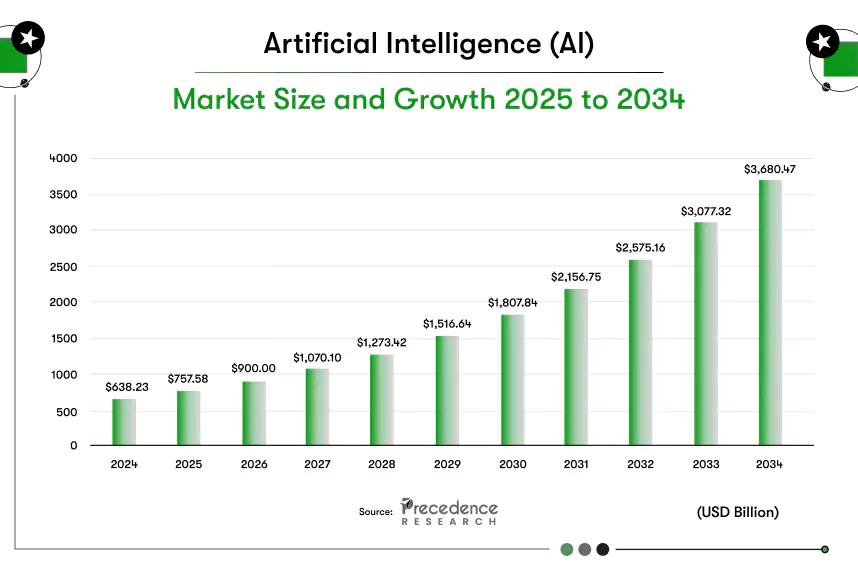
Healthcare, finance, eCommerce, marketing, and education are leading the charge, while emerging applications like autonomous agents, AI copilots, and predictive analytics are creating entirely new business models. This makes artificial intelligence one of the most profitable areas for startups and enterprises alike.
In this blog, we explore the most profitable AI business ideas for 2026. You will learn which industries are unlocking the highest returns, how AI startup ideas are reshaping sectors, and what business ideas using AI can deliver sustainable growth.
For entrepreneurs, the key is execution; turning an AI idea into a market-ready product with the help of expert AI Development Services.
If you are wondering how to use AI to start a business that thrives in the coming years, this guide will give you clarity and direction.
What makes AI business ideas profitable in 2026?
AI business ideas are profitable in 2026 because they do more than improve processes. They reduce operational costs, protect revenue, unlock personalization, and create new product categories that didn’t exist before. Combined with heavy investor backing and rapid technological progress, this makes AI the most lucrative innovation wave since the internet.
Cost savings that go straight to the bottom line
Profitability often begins with efficiency. AI solutions have proven they can cut costs on a scale that manual systems never could. For instance, AI-powered customer service tools reduce support costs by over 30% while also improving response times. In human resources, AI automates repetitive screening and onboarding tasks, delivering efficiency gains of up to 75%. These savings are not cosmetic. They allow businesses to redirect resources toward growth instead of administration, giving AI-driven startups a cost structure that legacy players can’t match.
Protecting revenue through advanced risk management
Another reason AI business ideas are profitable lies in their ability to protect what companies earn. Fraud detection is a prime example. In eCommerce and finance, AI systems now reach up to 99% accuracy in spotting fraudulent activity. PayPal’s AI fraud detection models save billions of dollars annually by preventing losses before they occur. Unlike traditional systems, which catch fraud after the fact, AI-driven platforms create proactive security that keeps revenue intact. For businesses, this is profitability not through growth, but by avoiding erosion.
Driving new revenue through personalization
AI is equally powerful on the revenue side of the equation. Personalized recommendations, marketing campaigns, and learning experiences powered by machine learning have been shown to increase sales by nearly 20%. That uplift is significant in competitive markets like retail and digital media, where margins are tight. For businesses, AI-driven personalization doesn’t just improve customer experience, it converts directly into higher revenue per customer and longer retention cycles.
Backed by strong investor momentum
Profitable AI business ideas also benefit from one of the most favorable investment climates in decades. In 2023, Amazon committed $4 billion to Anthropic, showing that institutional investors see AI as a long-term growth engine. At the same time, the reality is that only about 33% of AI startups succeed, which means capital flows primarily to teams that demonstrate strong execution. For entrepreneurs, this creates a high-risk but high-reward environment where profitable ideas can secure not just market traction but also significant funding.
Aligned with future technology shifts
Finally, AI business profitability is supported by upcoming shifts in the technology landscape. Breakthroughs such as agentic AI, physical AI systems, and sovereign AI will create entirely new categories of business opportunities. Entrepreneurs who align their ventures with these AI Trends are more likely to stay profitable in the long term, as they won’t just be riding today’s wave but also preparing for tomorrow’s.
What are the most profitable AI business ideas for 2026?
AI business ideas are not confined to a single market. Their profitability comes from adoption across healthcare, finance, eCommerce, and marketing. Each of these sectors shows measurable growth backed by data-driven AI use cases.
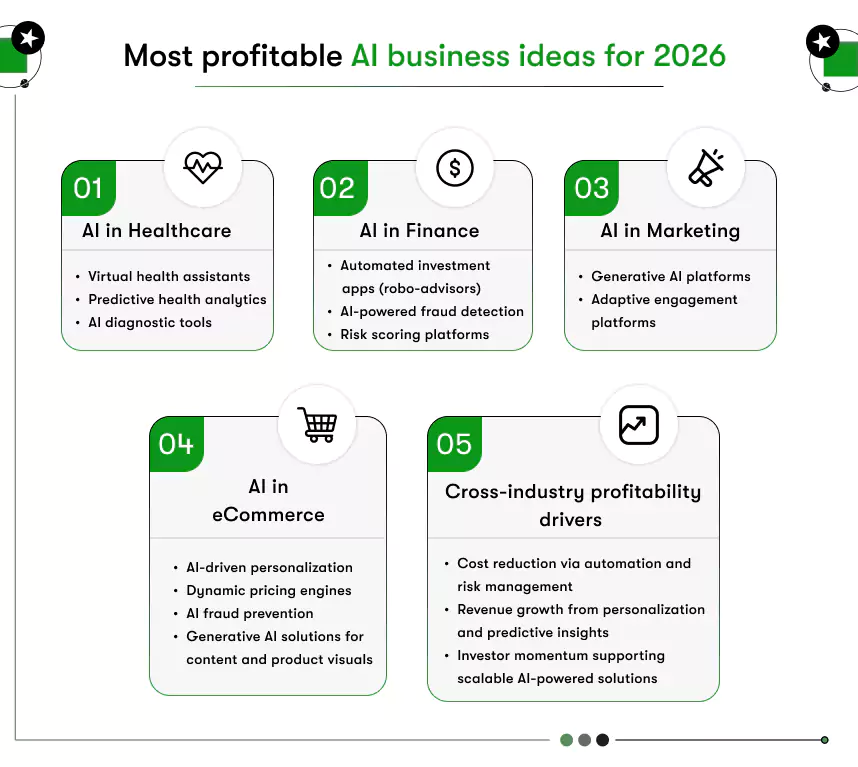
For entrepreneurs and investors, these industries highlight where AI is delivering the strongest returns in 2026.
AI in Healthcare
Healthcare is undergoing an AI-driven transformation. The global telehealth market is projected to grow from USD 161.64 billion in 2024 to USD 186.41 billion in 2025. Virtual AI health assistants are central to this shift, offering 24/7 support and reducing pressure on healthcare systems.
AI in Healthcare is driving massive value through predictive analytics, one of the most lucrative areas in the medical sector. The global healthcare analytics market is expected to reach USD 80.21 billion by 2026, growing at a 27.5% CAGR. Predictive health models help hospitals forecast patient outcomes, reduce readmissions, and optimize resources.
Profitable AI ideas in this sector include:
1. Virtual Health Assistants:
These are more than chatbots, they act as digital care partners. Virtual health assistants track vitals, remind patients about medications, and connect them with doctors in real time. Hospitals use them to handle routine inquiries and post-treatment monitoring, cutting admin costs and improving engagement. Their ability to operate 24/7 translates directly into saved labor hours and better patient satisfaction scores.
2. AI Diagnostic Tools:
AI diagnostic systems read X-rays, MRI scans, and pathology slides in seconds, identifying diseases like cancer or pneumonia with accuracy that rivals specialists. This reduces diagnosis time and increases throughput in hospitals. Each accurate detection saves lives, avoids expensive late-stage treatments, and boosts hospital reputation which are all key profitability drivers.
3. Predictive Care Platforms:
Predictive analytics platforms analyze historical patient data to forecast hospital admissions and identify risk patterns for chronic illnesses. By predicting emergencies, hospitals can optimize staff schedules and inventory, minimizing wastage and operational inefficiencies. The result is reduced readmission rates and higher profitability per patient.
Building such solutions requires strong AI app development capabilities to ensure compliance, accuracy, and scalability.
AI in Finance
AI in Finance has become one of the most profitable areas within the technology ecosystem. The global AI in finance market is expected to reach USD 22.6 billion by 2025. Fraud detection remains a major contributor to these profits. PayPal, for instance, reports that its AI-powered fraud detection models achieve up to 99% accuracy, saving billions annually.
For startups, opportunities lie in:
1. Automated Investment Apps:
Robo-advisory apps use AI to build and rebalance personalized portfolios based on risk appetite and market conditions. These apps scale advisory services without human limits, creating continuous subscription-based income for fintech firms. The more users they onboard, the higher the return with minimal incremental cost.
2. AI-Powered Fraud Detection Engines:
Traditional fraud detection reacts after losses; AI models prevent them before they happen. These engines monitor millions of transactions in real time, learning user behavior and flagging anomalies instantly. PayPal’s systems, for example, detect fraud with up to 99% accuracy saving billions annually. Prevented loss equals protected profit.
3. Risk Scoring Platforms:
AI risk scoring replaces rigid credit scoring with behavior-driven analysis. It examines nontraditional data such as spending habits or social transactions to measure credibility. For banks, this widens the lending pool while maintaining low default rates, increasing both inclusivity and revenue stability.
Fintech entrepreneurs considering how to integrate AI into an app should focus on compliance and security, since trust is key to adoption.
AI in eCommerce
AI in eCommerce continues to be one of the strongest profit drivers for the retail industry. The global eCommerce AI market is projected to grow exponentially as retailers depend on automation and personalization to increase margins and retain customers. Businesses are using AI to predict consumer intent, optimize pricing, and create marketing assets instantly.
For startups and retailers, opportunities lie in:
1. AI-Driven Personalization Engines:
Recommendation algorithms powered by AI analyze browsing patterns, purchase history, and behavioral data to deliver relevant suggestions to every user. These engines boost sales conversions by 10–20% and raise average order values. Beyond sales, personalization improves customer retention and loyalty, turning every transaction into a data point that fuels future predictions.
2. Dynamic Pricing Engines:
AI systems track competitor pricing, stock levels, and demand in real time to recommend optimal prices for each product. Unlike static pricing models, dynamic AI engines respond instantly to market changes, ensuring consistent profitability. Retailers using such models experience better inventory turnover and higher margins during both high and low-demand periods.
3. AI-Powered Fraud Prevention Systems:
As digital transactions increase, so do risks. AI fraud prevention platforms analyze transaction data and user behavior to flag suspicious activity within milliseconds. These systems reduce chargebacks and false declines, keeping operational losses minimal while protecting consumer trust, a key profitability factor in online retail.
4. Generative AI Solutions for Content and Product Visuals:
Generative AI solutions create product descriptions, promotional visuals, and ad copies at a scale. They reduce design and content production costs by up to 60%, shorten go-to-market timelines, and maintain brand consistency. Retailers using such systems generate more campaigns with less manpower, translating directly to higher ROI.
For eCommerce entrepreneurs, AI ensures smarter operations and stronger engagement while optimizing both cost and creativity; a formula driving the industry’s next growth phase.
AI in Marketing
Marketing has become one of the most lucrative arenas for AI-driven innovation. As ad spending shifts toward digital, brands are depending on AI to analyze consumer behavior, automate campaign management, and personalize outreach at scale. The global marketing technology sector, powered heavily by AI, is expected to exceed USD 650 billion by the end of 2025.
For startups and agencies, opportunities lie in:
1. Generative AI Platforms for Content Creation:
AI platforms such as Adobe Firefly, Synthesia, and Canva AI empower marketers to generate videos, graphics, and copy within minutes. This automation eliminates creative bottlenecks and reduces production expenses by nearly half. Companies can launch more campaigns faster, gaining a clear competitive edge in high-volume markets.
2. Adaptive Engagement Platforms:
These AI systems monitor real-time user interactions across channels like clicks, scrolls, watch time, and adjust messaging, visuals, or offers dynamically. Adaptive engines ensure that campaigns evolve continuously with audience behavior, raising engagement rates and lowering wasted ad spend.
3. Predictive Campaign Analytics:
Predictive analytics uses historical performance data and customer sentiment to forecast which campaign strategies will yield the best ROI. Marketers can test scenarios, allocate budgets effectively, and personalize outreach before launching, reducing risk while maximizing conversions.
For marketing teams and SaaS startups, AI is turning intuition-based campaigns into precision-driven strategies that deliver higher conversions and measurable business impact.
Why these AI business ideas are profitable
Across industries, AI business ideas share three profitability drivers:
- Cost reduction through automation and risk management.
- Revenue growth from personalization and predictive insights.
- Investor momentum that rewards scalable, AI-powered solutions.
Entrepreneurs who align domain expertise with reliable AI app development partners can turn these opportunities into high-growth businesses.

What emerging AI business ideas should startups explore in 2026?
Not all AI business ideas are tied to established industries. Some of the most profitable opportunities in 2026 will come from emerging applications that redefine how businesses operate.
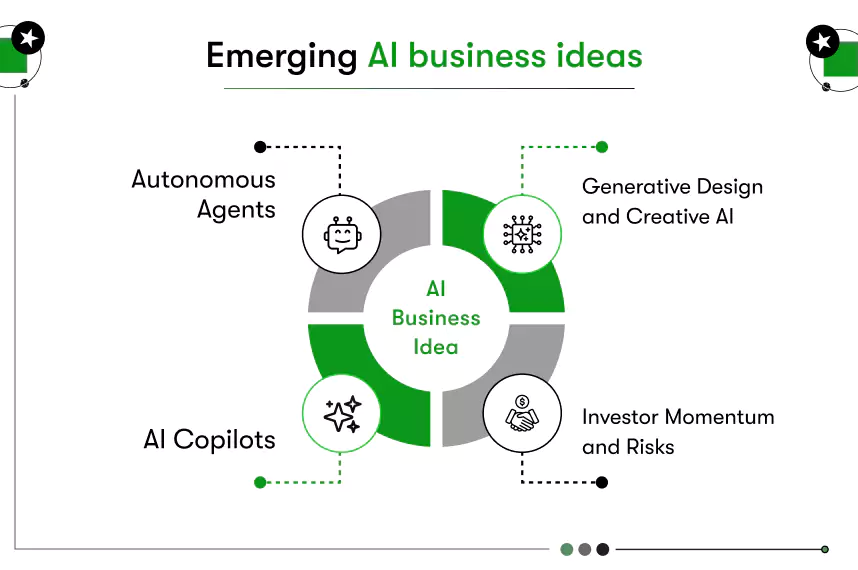
For startups, these ideas represent the next frontier areas where market demand is rising but competition has not yet saturated the space.
Autonomous agents
Autonomous agents are among the most promising AI opportunities. These systems can independently perform tasks such as logistics coordination, financial reporting, or customer support without constant human oversight. Startups building sector-specific agents, for example, supply chain optimization bots or AI-driven procurement assistants, stand to capture significant market share. The advantage lies in scalability- once trained, an autonomous agent can be deployed across multiple enterprises at minimal incremental cost.
AI copilots
AI copilots are rapidly transforming productivity. From software development assistants to workflow copilots embedded in enterprise systems, these tools can boost efficiency by up to 40% according to multiple adoption studies. Microsoft’s GitHub Copilot, for example, has already demonstrated the value of AI-augmented coding, helping developers write code faster and with fewer errors. Startups can extend this concept to other domains such as legal, finance, or design, offering copilots that act as real-time collaborators. The profitability of this model comes from its recurring revenue potential; most copilots are subscription-based, ensuring steady cash flow once adopted.
Generative design and creative AI
Generative AI has already disrupted content creation, but in 2026 its influence will extend deeper into design and product development. Tools that generate prototypes, visual assets, or marketing content are cutting costs and accelerating time-to-market. Platforms like Adobe Firefly and Synthesia illustrate how creative industries are adopting AI at scale. Startups that offer domain-specific ROI of AI Apps in generative design, whether for eCommerce visuals, architectural mockups, or advertising campaigns; are positioned to grow rapidly. Profitability comes from enabling businesses to achieve more with fewer resources, creating a clear return on investment.
Investor momentum and risks
Investor interest in these emerging AI ideas is strong. Amazon’s $4 billion investment in Anthropic demonstrates the appetite for companies pushing the boundaries of AI. However, entrepreneurs should note that AI startup success rates remain at around 33%, highlighting that execution, differentiation, and strategic partnerships are critical. Emerging AI opportunities carry high upside but also demand careful planning to avoid being swept away in the wave of competition.
Emerging AI ideas like autonomous agents, copilots, and generative design are more than trends; they are profitable business opportunities with scalable demand. For startups, the challenge is building applications that demonstrate clear value and measurable ROI, ensuring sustainable growth in an increasingly competitive AI landscape.
What challenges and risks come with AI business ideas in 2026?
AI business ideas may be profitable, but they are not without risks. Startups and enterprises entering the AI space in 2026 must account for technical, financial, and ethical challenges that can impact growth and sustainability.
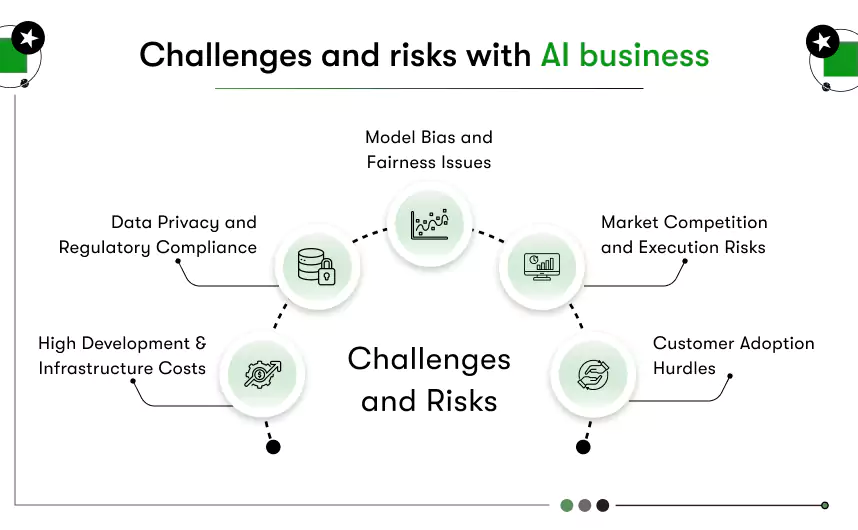
Ignoring these risks often turns promising ventures into costly failures.
High development and infrastructure costs
Building AI solutions requires significant upfront investment. From acquiring quality datasets to training models and maintaining cloud infrastructure, costs can escalate quickly. For early-stage startups, these expenses often outpace revenue in the short term. Understanding the Cost to Develop an AI App is critical before committing resources, since underestimating it can erode profitability. Entrepreneurs who plan for infrastructure scaling and optimization stand a better chance of sustaining margins.
Data privacy and regulatory compliance
AI systems depend on vast amounts of data. In sectors like healthcare and finance, regulations such as HIPAA and GDPR impose strict guidelines on how data can be used. Mishandling personal information can lead to fines, lawsuits, and reputational damage. For businesses, profitability is tightly linked to trust. AI startups that prioritize compliance and transparency will find it easier to attract customers and partners.
Model bias and fairness issues
Another major risk lies in biased algorithms. AI systems trained on unbalanced data can reinforce discrimination in hiring, lending, or healthcare. This not only raises ethical concerns but also creates legal liabilities. Startups must invest in bias detection and model validation to avoid long-term consequences. Profitable AI businesses are those that balance innovation with fairness, ensuring inclusivity in their solutions.
Market competition and execution risks
The AI boom has created intense competition. With thousands of startups entering the space, differentiation is difficult. Research shows that around 90% of startups fail overall, often due to lack of product–market fit, capital shortages, and competitive pressures. In such a landscape, execution becomes the real determinant of profitability. A brilliant idea without a sound go-to-market strategy often fails, regardless of technology.
Customer adoption hurdles
While enterprises are eager to explore AI, not all users are ready to adopt complex systems. Resistance to change, lack of technical literacy, and integration challenges can slow adoption rates. Businesses must focus on creating user-friendly solutions that demonstrate clear ROI from day one.
Profitable AI business ideas in 2026 will not be those with the flashiest technology, but those that address these challenges head-on. By managing costs, ensuring compliance, mitigating bias, and building trust, entrepreneurs can reduce risks and unlock sustainable profits in the competitive AI landscape.
What future AI trends will shape profitable business ideas beyond 2026?
AI business ideas in 2026 are already highly profitable, but the real question is what comes next. The future of AI is not about incremental upgrades. It is about transformative shifts that will unlock new industries, redefine customer expectations, and create business opportunities that do not exist today.
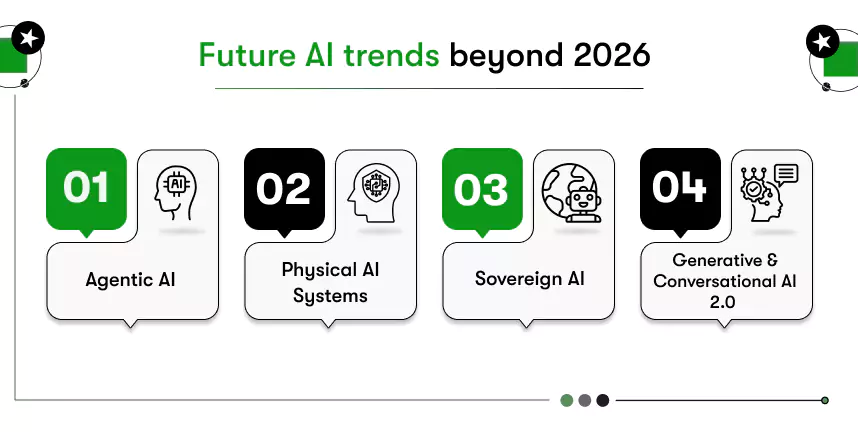
Entrepreneurs who anticipate these trends will be positioned to lead markets, not just compete in them.
Agentic AI
One of the most important future trends is agentic AI. Systems that can plan, reason, and act with greater autonomy than today’s models. Unlike basic chatbots or virtual assistants, agentic AI will be able to make decisions, coordinate multi-step tasks, and optimize outcomes in dynamic environments. For example, logistics firms may deploy agents that manage end-to-end supply chains without human oversight, while enterprises may use them for financial forecasting or legal research. Businesses that explore agentic AI early will be well-positioned to capture these multi-billion-dollar opportunities.
Physical AI systems
The convergence of robotics and AI will accelerate beyond 2026, leading to physical AI systems that operate in warehouses, hospitals, and even households. These machines will combine vision, language, and decision-making models to perform complex physical tasks. Imagine hospitals where AI-powered robots assist surgeons, or retail environments where autonomous machines manage inventory. While the upfront cost is high, the long-term profitability lies in labor optimization and new service models.
Sovereign AI
As governments and enterprises seek greater control over sensitive data, sovereign AI will become a defining trend. This involves developing models trained on localized datasets, respecting cultural, legal, and linguistic contexts. For example, financial institutions may prefer sovereign AI systems that comply with national data residency laws. Entrepreneurs who align with this trend can build profitable businesses by offering trusted, compliant, and region-specific solutions.
Generative and conversational AI 2.0
Generative AI will continue to evolve, moving from content creation to more complex innovation like drug discovery, product design, and advanced simulations. Similarly, conversational AI will progress beyond scripted interactions, becoming truly context-aware and proactive. Businesses already exploring how to Build AI Chatbots App can expect to see demand for next-generation conversational systems that engage customers across multiple channels seamlessly.
Future AI trends, agentic AI, physical AI, sovereign AI, and generative AI 2.0; will not only expand the scope of what’s possible but also define the most profitable AI business ideas beyond 2026. The entrepreneurs who embrace these shifts early will set the standards for the next era of business innovation.
Conclusion
AI business ideas in 2026 are not just about innovation; they are about profitability, efficiency, and long-term growth. From healthcare and finance to eCommerce, marketing, and emerging technologies, the opportunities are massive. Yet, the difference between success and failure lies in execution. Businesses need solutions that deliver measurable ROI, scale effectively, and remain compliant with industry standards.
For entrepreneurs and enterprises, this means choosing the right development partner. As a trusted Generative AI development company, Kody Technolab Ltd has helped global businesses transform bold ideas into profitable AI solutions. Our team specializes in building applications that combine technical excellence with real-world business impact.
Whether you want to create intelligent chatbots, predictive platforms, or AI copilots, you need the right expertise to bring your vision to life. By choosing to Hire AI Developers from Kody Technolab Ltd, you gain access to experienced professionals who understand both the technology and the business side of AI.
The future belongs to those who act early. Partner with Kody Technolab to turn today’s profitable AI business ideas into tomorrow’s market-leading solutions.

FAQs
1. What are AI Business Ideas?
AI Business Ideas are startup concepts that use artificial intelligence to automate processes, predict outcomes, or personalize user experiences.
2. Why are AI Business Ideas profitable in 2026?
They reduce costs, improve efficiency, and open new revenue streams across multiple industries.
3. What are some emerging AI Business Ideas?
AI copilots, autonomous agents, and generative design platforms are reshaping how businesses operate and scale.
4. How do I validate if my AI Business Idea is worth pursuing?
Start with proof of concept. At Kody Technolab, our experts help founders analyze market demand, assess feasibility, and plan scalable AI solutions before development.
5. How can Kody Technolab help me build a profitable AI product?
Kody Technolab designs and develops end-to-end AI solutions tailored to your business goals, ensuring measurable ROI and faster market growth.
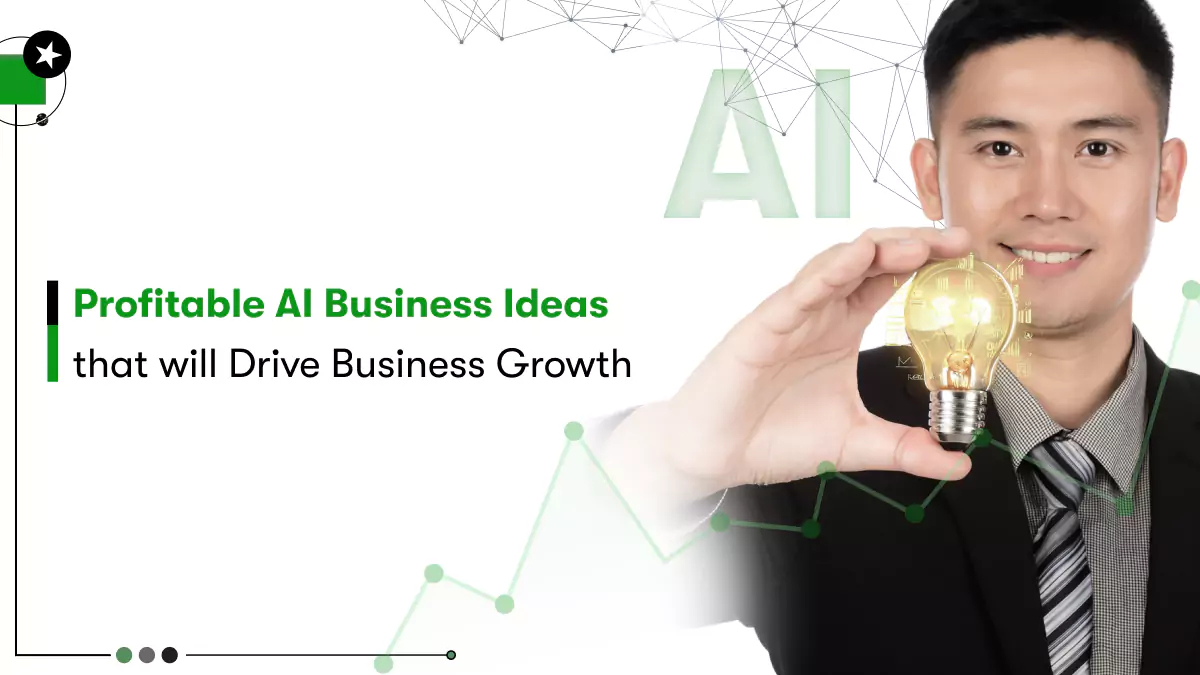
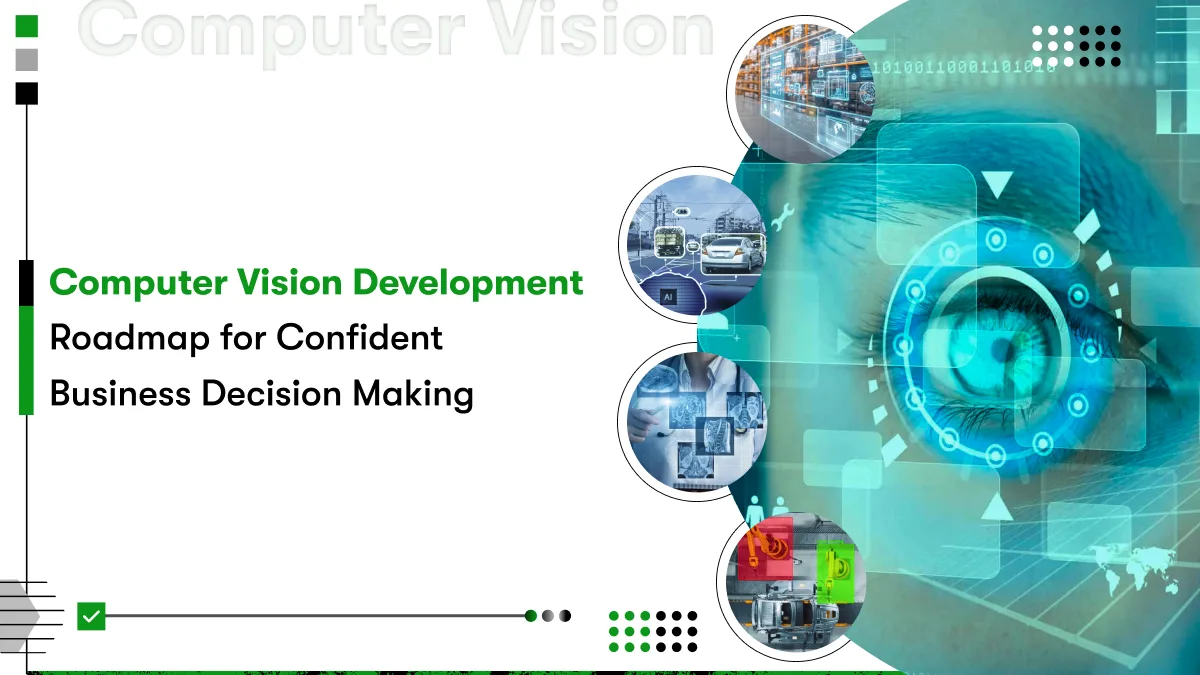
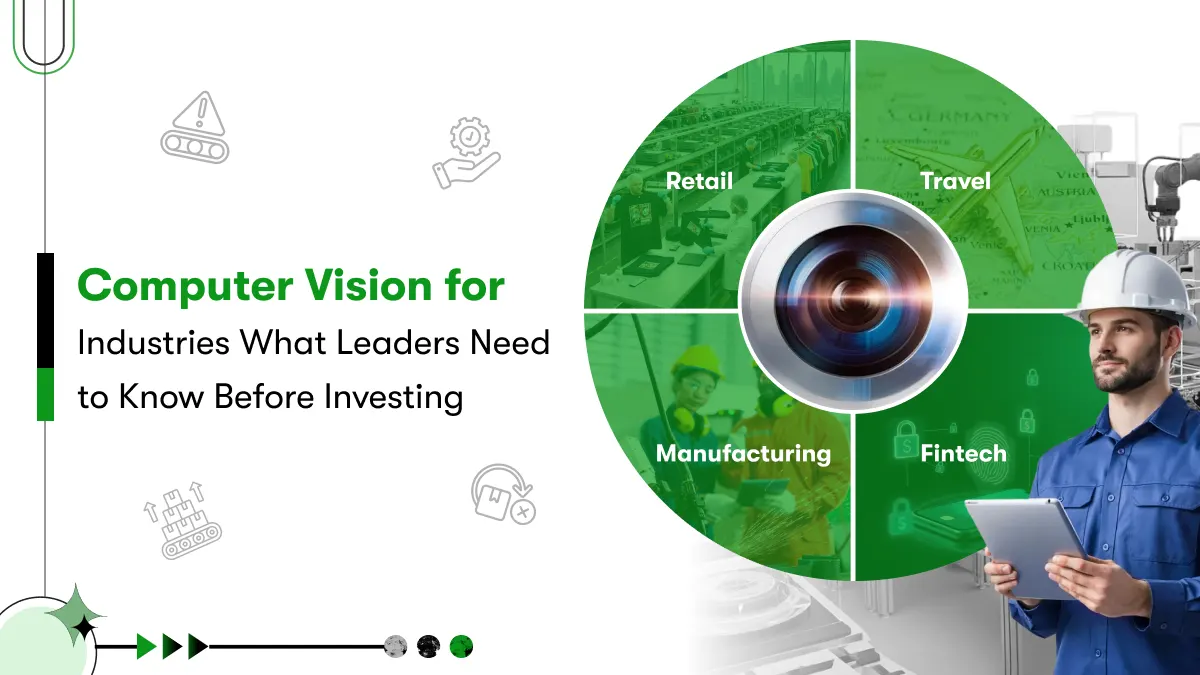

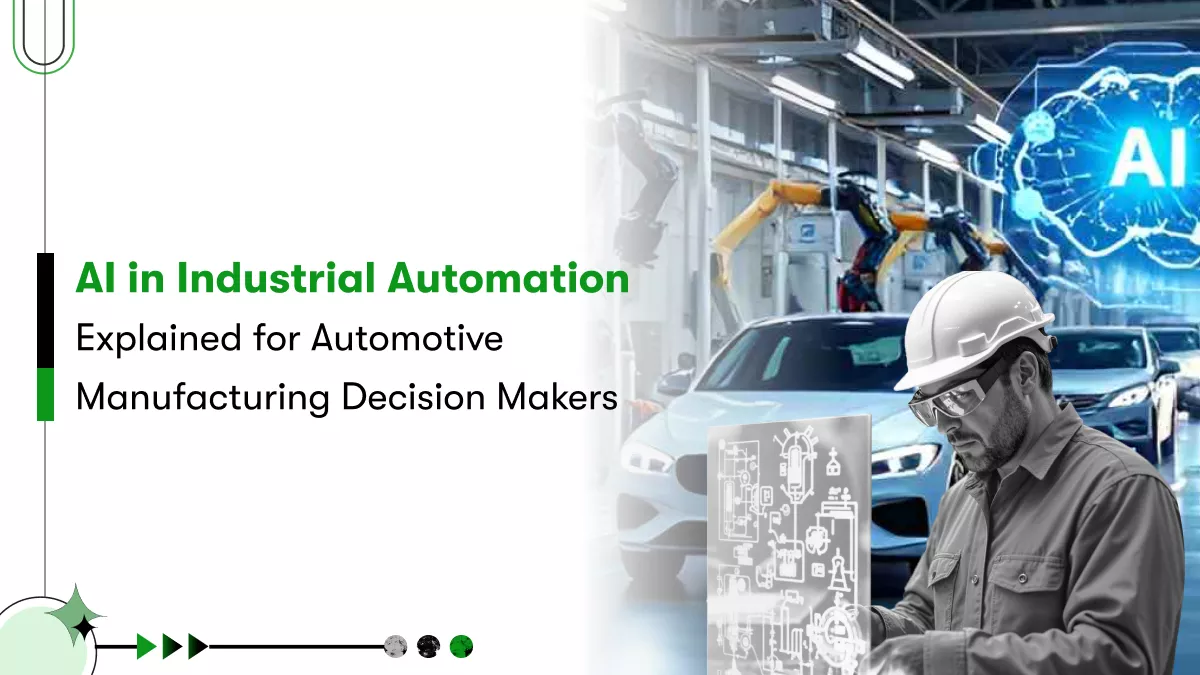
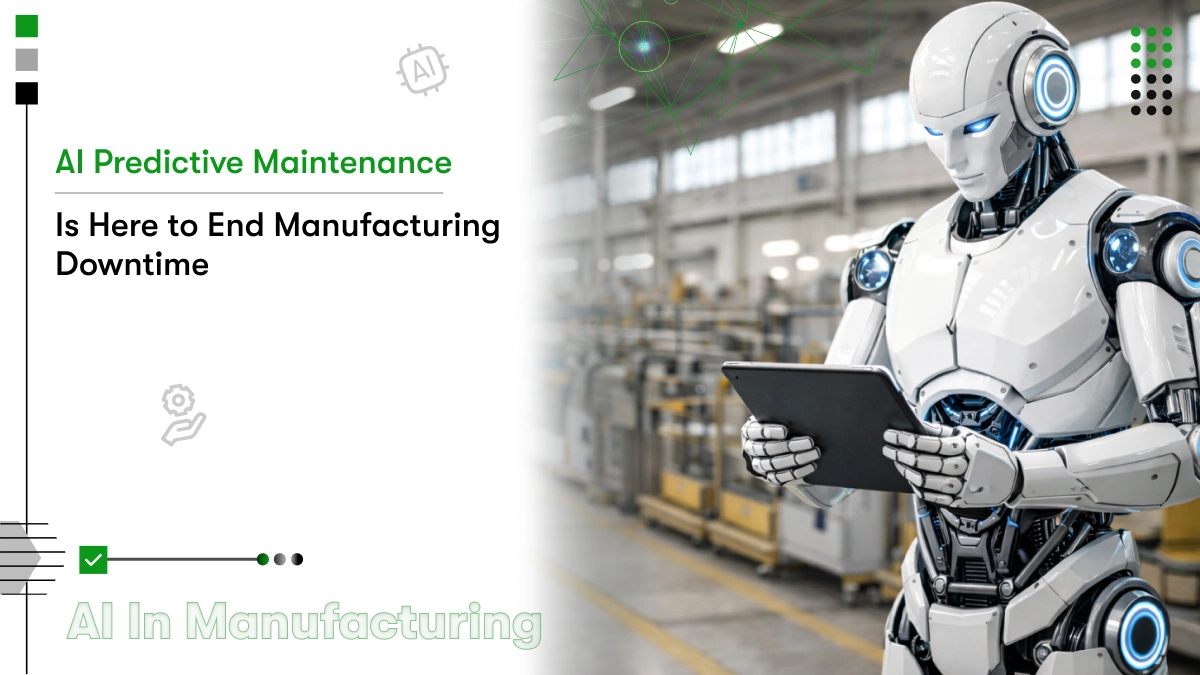






 Contact Information
Contact Information